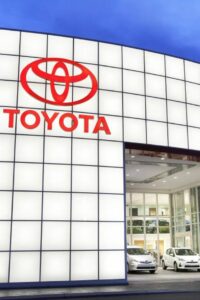Toyota is gearing up to revolutionize the electric vehicle industry with the introduction of the world’s first cars powered by all-solid-state batteries — a technology that promises to redefine performance, safety, and charging speed in electric mobility.
The Japanese automaker has confirmed plans to begin production and sales of solid-state battery electric vehicles (EVs) between 2027 and 2028, marking a major leap from conventional lithium-ion batteries currently used in most EVs.

A Leap Toward the Future of EV Technology
Solid-state batteries replace the liquid electrolytes found in traditional lithium-ion cells with solid materials. This change offers multiple advantages — longer driving range, faster charging, improved safety, and potentially a longer battery lifespan.
Toyota aims to deliver an impressive range of over 1,000 kilometers (about 620 miles) on a single charge — more than double what most EVs currently achieve. Even more striking is the company’s goal for ultra-fast charging: from 10% to 80% in just about 10 minutes.
—
Strategic Partnerships and Breakthroughs
To bring this innovation to life, Toyota has partnered with major Japanese companies, including Idemitsu Kosan and Sumitomo Metal Mining.
Idemitsu Kosan is collaborating on the development and production of solid electrolytes, a key component that allows the battery to store energy efficiently and safely.
Sumitomo Metal Mining is working with Toyota to create more durable and stable cathode materials, designed to withstand repeated charging cycles without degrading.
These partnerships are crucial as Toyota works to overcome the challenges of mass production and ensure the new battery technology is cost-effective and reliable for widespread use.

—
Overcoming Manufacturing Challenges
While solid-state batteries are widely seen as the “holy grail” of EV technology, they are notoriously difficult and expensive to manufacture. The solid materials used can be brittle and sensitive, making large-scale production complex.
Toyota says it has made key breakthroughs to improve battery durability and is confident that its collaboration with partners will lead to commercial readiness before the end of the decade.
Before the solid-state era begins, the company also plans to launch a new generation of advanced lithium-ion batteries by 2026, featuring better range, lower costs, and faster charging capabilities.
—
What It Means for the Industry
Toyota’s move could reshape the global EV market, setting new performance standards that competitors like Tesla, Hyundai, and BYD will have to match. If successful, solid-state batteries could make electric cars lighter, safer, and more convenient — addressing some of the biggest concerns drivers have today.
However, initial production will likely be limited and expensive, meaning that early models could target high-end consumers before costs gradually decrease with scale.
—
The Road Ahead
With the global race toward carbon neutrality accelerating, Toyota’s announcement positions it once again at the forefront of automotive innovation. The company’s progress in solid-state battery technology could redefine what electric vehicles are capable of — delivering longer range, shorter charging times, and safer performance — all while pushing the industry closer to a sustainable future.
—
In short: Toyota’s solid-state battery EVs represent not just another step in automotive evolution but a potential turning point that could shape the next generation of electric mobility.






